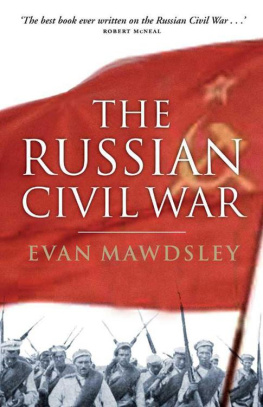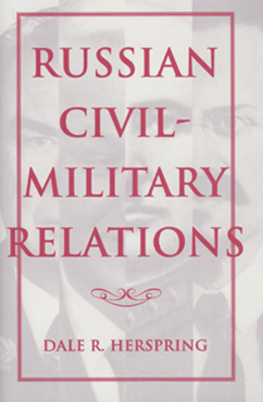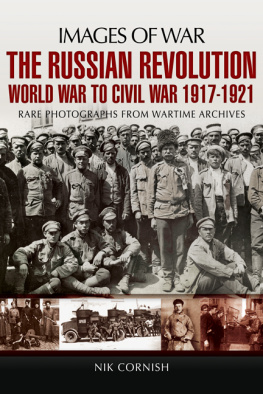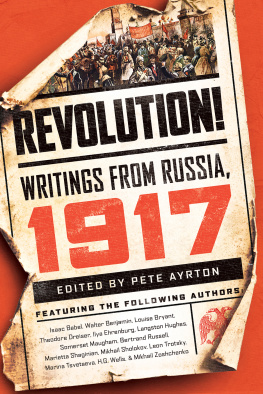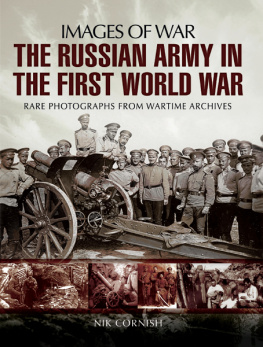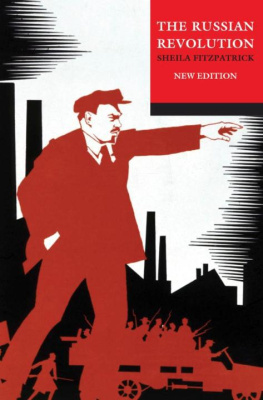THE RUSSIAN CIVIL WAR
EVAN MAWDSLEY
This eBook edition published in 2011 by
Birlinn Limited
West Newington House
Newington Road
Edinburgh
EH9 1QS
www.birlinn.co.uk
First published in 1987 by Allen and Unwin, Inc.
First published by Birlinn Ltd in 2000
This edition first published in 2008 by Birlinn Ltd
Copyright Evan Mawdsley 1987, 2000, 2008, 2011
The moral right of Evan Mawdsley to be identified as the author of this work has been asserted by him in accordance with the Copyright, Designs and Patents Act 1988
All rights reserved. No part of this publication may be reproduced, stored or transmitted in any form without the express written permission of the publisher.
eBook ISBN: 978 0 85790 123 1
British Library Cataloguing-in-Publication Data
A catalogue record for this book is available from the British Library
Contents
PART I
1918: Year of Decision
PART II
1919: Year of the Whites
PART III
1920: YEAR OF VICTORY
Preface
Although it was six in the morning, night was yet heavy and chill. There was only a faint unearthly pallor stealing over the silent streets, dimming the watch-fires, the shadow of a terrible dawn grey-rising over Russia.
John Reed, Petrograd, 26 October 1917
If the term apocalyptic fits any event in recent world history, it fits the Russian Civil War. This is not to suggest that the events of 19171920 were the end of the world. The revolutionaries saw what was happening as the beginning of a new human order, and if they did not in fact found a New Jerusalem, we can see, seventy years later, that they certainly created in Russia something remarkable and enduring. But their hold on power was bought at the price of great suffering and an unknown but terrible number of deaths perhaps 710 million in all. War and strife, famine and pestilence the Four Horsemen of the Apocalypse devastated the largest country in Europe for three years.
The history of Russia in 19171920 is a vast topic, and no one book could give it comprehensive treatment. Throughout the present work the emphasis is on the Civil War itself. The difficult birth of the worlds first socialist state and economy which coincided with the Civil War is a separate topic and one about which much has already been written. The same is true of the (rather less important) foreign reaction to Russian events. The changes in Russian society and the stirrings of the national minorities are also distinct problems, although these await fuller specialist treatment. All these topics are indeed raised here, but mainly to see how they related to the eventual victory of the Red side. Even in dealing with the events of the Civil War the emphasis will be on the critical areas and not on regions such as north Russia, eastern Siberia, Central Asia, and the Transcaucasus, whose fate was decided by developments elsewhere. No apology is needed for the discussion of armies and campaigns; the success of the Reds and the failure of their enemies, anti-Bolsheviks and nationalists, was decided ultimately at least by force of arms.
Had the present book been published in the USSR it would probably be called a nauchno-populiarnyi ocherk, an accessible yet scientific account. No particular knowledge of Russian history is assumed. The emphasis is on bringing together and making understandable material from a wide range of sources. I have relied on some high-level documents (a number of them published recently) and on relatively well-known memoirs, but especially on the work of other historians. The jigsaw puzzle being put together by specialist historians, especially the Western version, is far from complete, but without it the present survey could not even have been thought about. Notes have been kept to a minimum, although the basic sources for each chapter are outlined in the bibliographical essay.
A few points of form. I have referred to Lenins party as the Bolsheviks throughout, even though they changed their name to the All-Russian Communist Party in early 1918; this seemed better for flavor. The term White has been reserved, as it should be, only for the conservative, officer-dominated part of the counterrevolution. Ranks were abolished in the Red Army in December 1917, but pre-Soviet ranks are given here to show military experience. (On the White side, officers are given their Civil War ranks, although many of the generals had been only majors and colonels in the Tsarist army.) It is worth remembering, too, that both sides used terms such as army group, army, division, and regiment with poetic license. The right bank is on the right when you are in the middle of the river looking downstream; your right flank is on the right when you confront an enemy force and it normally faces the enemys left flank. Dates follow the practice of the central Russian government. This means that before 14 February 1918 the dates given in the old style Julian calendar are thirteen days early; from 14 February 1918 they are new style, the same system as that used in the West. The Library of Congress system is used to transliterate the cyrillic alphabet, with the usual simplifications for proper names (a fuller version is used in the notes and bibliography). Many foreigners writing about Russia become unconscious Great Russian centralizers, and like them I will use the more familiar Russian version of certain non-Russian proper names rather than a more correct version (Kiev rather than Kyiv, Brest rather than Brzesc, Vatsetis rather than Vacietis, Grigoriev rather than Hryhoriev, etc.).
Thanks are due to many people. Staff at the excellent library of the Institute for Soviet and East European Studies (University of Glasgow) gave invaluable service over a long period; the same was true for the Inter-Library Loan Department. Michael Shand of Glasgows Geography Department drew the final maps, which are the best I have seen anywhere on the Civil War era. A symptom of how long this book has been in preparation is that when it began I had never heard of the silicon chip; now I must say that without Ann Laird and Kelvin Tylers continuing encouragement and technical advice on word processing, the manuscript would have taken even longer to produce than it actually did.
Fifteen years worth of final-year and postgraduate students in my Russian Revolution seminar provided lively and commonsense discussion of many of the points raised here; I find (in retrospect, at least) the links between teaching, research, and writing to be really vital. And finally, I am especially grateful to friends and colleagues David Collins, David Gillard, Robert McKean, Brian Pearce, Keith Robbins, and Robert Service, who read all or part of a draft. Each had his own perspective, and each made constructive and valuable comments. Any remaining shortcomings, of course, are my own responsibility.
Preface to the 2008 Edition
Historians differ about the precise start of the Civil War, but probably the majority would say it began in 1918, some 90 years ago. The third edition of this book coincides with that anniversary.
The study of the conflict has altered in two major ways since The Russian Civil War was originally written in the mid 1980s. First of all there has been a great change of perspective. My 1987 preface described Soviet power as enduring (p. v), but it would not in fact endure beyond 1991. Of course, the authority established by the Bolsheviks in 1917 endured for more than seventy years, but Russian Communism did come to an unexpected end.
Was the Civil War related to the eventual collapse of Communism? So much else happened in the seventy years between 1921 and 1991 that it is hard to see direct links. And it was the Bolshevik seizure of power,

